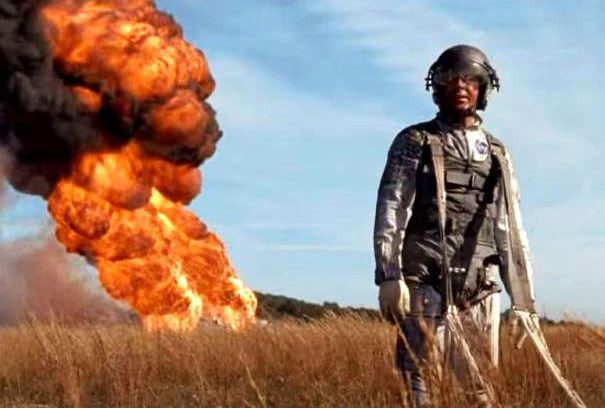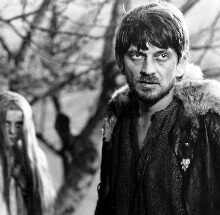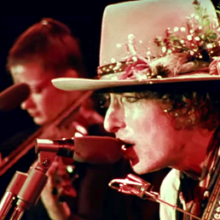
 Tells the story of astronaut Neil Armstrong by emphasizing the grief at losing his little daughter, and his subsequent shutting down of emotions and immersion in his work.
Tells the story of astronaut Neil Armstrong by emphasizing the grief at losing his little daughter, and his subsequent shutting down of emotions and immersion in his work.
First Man, directed by Damien Chazelle, is the story of astronaut Neil Armstrong, the first man to walk on the moon. It covers his career from being a test pilot at Andrews Air Force Base in 1961, all the way to the Apollo 11 mission that landed on the moon eight years later. This all sounds very workmanlike, but the film is surprising in its tone and emphasis. Adapted by Josh Singer from a biography by James R. Hansen, the film shows us an intensely private, moody person who had trouble connecting with those closest to him; and his family has said that this portrait is pretty accurate.
Ryan Gosling plays Armstrong, and his physical presence is very different from the open, broad-faced, country boy look of the Ohio-born astronaut. These kinds of things are common issues that arise when actors play famous people. Yet Gosling’s direct gaze and contained movements overcome this difference, I think, and he especially fits the part as conceived by the writer and director—for the arduous career of the pilot and astronaut is conveyed alongside, and often in contrast to, Armstrong’s life with his family, in some ways typical of the image of fatherhood that was current in the 1960s, especially in middle America.
And there’s a kind of secret element involved in the father’s story—in the early part of the film we see his utter devotion to his 2-year-old daughter Karen. She is diagnosed with a brain tumor, and after an attempt at radiation treatment, she dies in early 1962. For the film, this is a pivotal event in Armstrong’s life, which led him to shut down emotionally to a great extent, and deal with his grief by plunging into more work, applying for and getting accepted into the astronaut program at NASA. He doesn’t mention Karen anymore, even to his wife, and this melancholy, this simmering feeling of grief under the surface, defines him in his relationships both to family and friends.
I think it’s interesting to compare First Man to the two other most famous film dramas about astronauts in the 60s. Philip Kaufman’s The Right Stuff, in 1983, adopted the boisterous humor and satiric edge of the Tom Wolfe book it was based on. Ron Howard’s Apollo 13, from 1995, is a more straightforward celebration of courage and ingenuity, capturing the image of the astronauts as it was largely experienced by the public at the time, and expertly telling an exciting story as well. First Man, on the other hand, is resolutely focused on the subjective point of view of the astronauts themselves, and although it portrays their achievements and tragedies with complete respect, there is darkness, so to speak, on the edges—hints of conflict not only within the self-contained Armstrong, but in the cultural and political fissures of the outside world.
The excellent English actress Claire Foy takes the rather thankless role of Armstrong’s wife Janet, frustrated at being largely shut out from Neil’s emotional life, as well as his distance from their two young sons; and she breathes real life into the part. Also fine is Jason Clarke as Armstrong’s closest friend, astronaut Ed White.
But the best aspect of the film, which I’ve saved for last, is Chazelle’s depiction of space flight itself. Rather than the polished display of technological wonders that is common for this subject, First Man gives us the confinement and inherently dangerous feeling of being shot into space in a tiny capsule, and having to pilot what almost seems like a tin can or toy contraption through incredible distances. Armstrong’s first mission, Gemini 8, the first successful docking with a satellite, was also a near disaster, and the movie puts you right in the middle of that with terrifying immediacy. His second flight, the moon landing itself, is incredibly surreal, as it must have seemed in real life. We see, for instance, the two astronauts’ point of view in the lunar module looking for somewhere to land on this totally alien looking place. The technical details in the film are rigorously accurate, and the final landing and moonwalk are breathtaking.
First Man is a film of deep implications, connecting the inner struggles of one human being with the greatest feat of exploration ever achieved.






